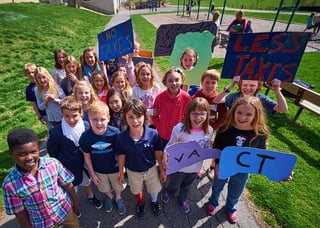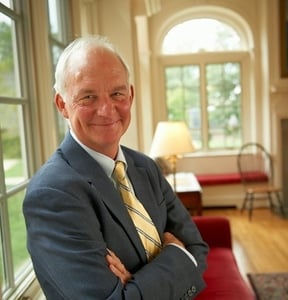 In a recent survey conducted by the Southern Poverty Law Center, over 2000 preK-12 teachers indicated that the current political campaign is having a disturbing impact on our children. They reported observing an increase in anti-Muslim or anti-immigrant sentiment, an increase in uncivil discourse, and a rise in sadness and fear.
In a recent survey conducted by the Southern Poverty Law Center, over 2000 preK-12 teachers indicated that the current political campaign is having a disturbing impact on our children. They reported observing an increase in anti-Muslim or anti-immigrant sentiment, an increase in uncivil discourse, and a rise in sadness and fear.
We have a teachable moment this fall, an opportunity to create a different kind of dialogue in which we can talk about issues, and feelings, with empathy and respect; to practice the kindness and dignity we’re not always seeing in the world around us. Westtown has long practiced this kind of teaching, learning, and listening, focused on finding common ground and the common good.
As Tom Hay, who has begun his 38th year of teaching at Westtown recently reminded me, ”We will do what we have always done when we have a concern - we stop, gather, and have a discussion.” This summer Westtown graduate and former faculty member Brennan Barnard ’92 wrote in a blog entitled Race, Education, and the Power of Silence in the Huffington Post, “Courage can mean speaking truth to power, but it can also mean listening for the truth in the noise, regardless of origin or delivery. We must resist knee-jerk reactions in order to hear one another. This is the beauty of an education in silence.”
Parker Palmer, author of Healing the Heart of Democracy and founder of the Center for Courage and Renewal, has written that the two most important qualities needed in response to current political conditions are chutzpah and humility. We need chutzpah to know that “I have a voice that needs to be heard and the right to speak,” and humility to accept the fact that our own truth is partial, “so I need to listen with openness and respect, especially to ‘the other,’ as much as I need to speak my own voice with clarity and conviction.” All of us need these habits of the heart in this season of violence, division, and the most polarizing election season I can remember.
Reflecting on this teachable moment in our opening faculty and staff meeting this fall, I offered a few guidelines for dialogue about the election and other challenging conversations with our children and students:
Listen first: ask “What have you heard? What questions do you have? What do you feel?” Reassure and support them. As Dr. Howard Stevenson, University of Pennsylvania Professor of Psychology and author of Promoting Racial Literacy in Schools advises, offer affection, correction, and protection.
Help students to complicate their thinking: focus on policy, issues, and values, rather than on rhetoric and personalities. Ask, “Which of this candidate's policies make you feel so passionately about him or her?”
Make empathy a theme for these conversations. Work on recognizing the emotional truth of someone else’s viewpoint. Teach children that they can disagree with others with empathy, encourage them (and ourselves) to consider walking in someone else’s shoes when they think about an issue. Set aside judgment so we can listen to others - and to ourselves - more deeply.
And, when the going gets tough, turn to wonder: “I wonder what he or she is trying to say? What in his or her experience brought him to this belief? I wonder what he’s feeling right now? I wonder what my reaction can teach me about myself?"
Help them to take positive, age appropriate action - by writing a letter to the editor or a blog, making a video, engaging in community service, volunteering, demonstrating, planting a garden, being a good friend. Help them to put their beliefs in action, even in a small way, and give them a sense of agency.
Speak your truth in a way that respects others’ truth and remember the great authority that you hold as an adult. As renowned educator and speaker on diversity and cross-cultural communication Rosetta Lee said to one of her students, “ I would not want your admiration for me to get in the way of your developing your own beliefs.”
In all of this we draw on a tradition of Friends education that is respectful of both individuals and of the group, that engages students in their own process of inquiry and discovery with a rich diversity of multiple perspectives, and orients them in a direction, as Palmer says, "that will be life-giving for them and for the world." My experience as a teacher and a leader in schools confirms that “Good teaching teaches skills, critical thinking, social consciousness...a great education nurtures a mature sense of hope, joy, and wonder. A great education touches the soul.”


